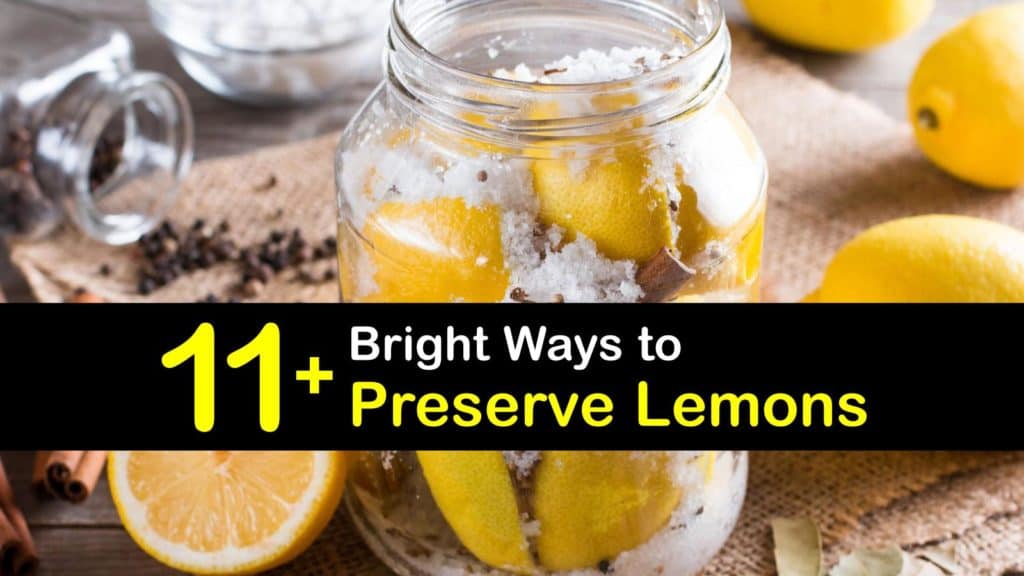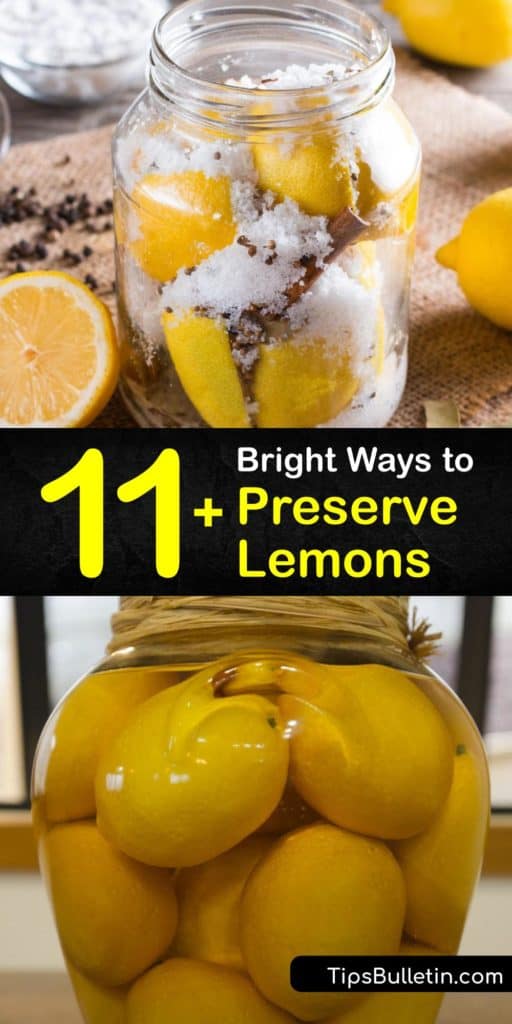If you’ve been blessed with living in a location where you can grow your lemons at home, then you understand the need for finding ways to preserve lemons before they spoil.
Whole lemons are bursting with juice, and it takes a lot of unique thinking to figure out how to use the entire fruit, rind included. Knowing how to preserve lemons is essential if you have a lemon tree in your backyard.
One adult tree produces up to 1,500 lemons every year. Scroll through this list of ways to preserve fresh lemons and decide what methods sound tasty and work for the type of cooking you do.
Fresh lemon is one of the most popular citrus fruits around the world. These sour, yellow fruits with a high acid content brighten rich dishes and easily cut through fats and oils. Lemon juice is an excellent source of fiber and vitamin C.
They are 89 percent water, but lemon juice is known to improve heart health and prevent kidney stones, anemia, and cancer. Whether squeezed for a dressing or peeled to garnish bloody Marys, organic lemons are fruits that we take for granted.

- Interesting Lemon Facts
- Ways to Preserve Lemons
- How to Preserve Lemons in Salt
- Turn Lemons into Seasoning
- Preserving Lemons in the Freezer
- Making Marinades and Dressings
- Making Pickled Lemon Peels
- Fermenting Lemons
- Making Lemon Jam
- Creating Canned Lemon Tea
- Making Preserved Lemons into a Condiment
- Moroccan Recipe using Preserved Lemons
- Making Lemon Curd
- Dehydrated Lemons
Interesting Lemon Facts
Lemons are only native to Asia and are a hybrid between sour oranges and citron. One adult lemon tree produces year-round fruit and up to 600 pounds of fresh lemons each year. The fruits are not the only beneficial part of the plant.
Lemon leaves are used for making teas, and the high-acid content is transformed into powerful cleaning products. Lisbon, Eureka, and Meyer lemons are the three most popular kinds found in the United States.
Knowing how to preserve lemons or preserving lemon juice is a task that takes some practice. There are dozens of methods to try, and finding the best way to preserve lemons depends on your personal preferences.
Ways to Preserve Lemons
If you have a lot of extra lemons or juice, you don’t want them to spoil. Learn how to tell if lemon juice is bad and store fresh juice and lemons properly so you have them when you need them.
What comes to your mind first when you think of preserved lemons? Some people think of canned lemons, others think of salted lemons, but there are some unique ways to preserve fresh lemons that you’ve likely never even considered. Be brave and take a chance with one of these recipes for preserving lemons, whether you will be canning lemons or dehydrating them.
How to Preserve Lemons in Salt
People have been preserving lemons in salt for centuries, especially when we didn’t have refrigerators. Salt-preserved lemons are standard in middle eastern cuisine and one of the most well-known techniques.

Take a quart-sized canning jar and sterilize it thoroughly in hot, soapy water. Dry the jar with a clean paper towel. Wash seven or eight whole lemons under cold running water and pat them dry. Slice each end of the lemons to create flat bottoms.
Stand each lemon on one flat end and cut an “X” in the lemon until there is only half an inch left before you cut all the way through. Open the lemon so the base remains intact, and fill the inside with half a tablespoon of sea salt.
Once the lemons are salted, pack them tightly into a jar using a pestle or similar tool. Add another tablespoon of salt to the glass jar and press on them one more time to extract as much fresh lemon juice as possible.
If the liquid covers the tops of the lemons, place the lid lightly on the quart jar. If not, add juice from additional lemons until they are covered.
Store the salted lemons in a cool, dark place for one week. Shake the jar once per day during that week. Then, put your jar in the refrigerator. The lemons are ready for use once the peels are translucent and soft.
Rinse the excess salt from the lemons before consuming them. Cut away the rind and pith and discard it. The lemons are safe to store this way for up to six months in the refrigerator.
Turn Lemons into Seasoning
Lemons are fantastic for creating seasonings, and lemon salt is a huge hit. Rub it on chicken, or toss it with pasta for a bright, lemony kick.
Zest three Meyer lemons with a pestle and mortar. Add three tablespoons of Maldon salt and use the pestle to combine the zest and salt.
Store the lemon salt in an airtight container or plastic bag with all the excess air removed. Add peppercorns to the recipe if you’d like to turn it into lemon-pepper seasoning.
Preserving Lemons in the Freezer
The freezer is our best friend when it comes to preserving foods, like any type of peppers, tomatoes, or pears. Freezing whole lemons is an option, as are slices or juice. The freezer is an excellent way to keep lemons fresh to make lemonade later or to add to a recipe.
To preserve strawberries or lemon pieces, place them in a freezer bag and store them for six months in the freezer.
Can you freeze lemon juice? Definitely! To properly freeze lemon juice, squeeze the juice into ice cube trays and put the tray in the freezer overnight.
Remove the lemon juice cubes from the tray and transfer them to a freezer bag so they’re easy to remove when you need them.
Making Marinades and Dressings
Marinades and salad dressings are some of the most popular recipes to use lemons in. Surprisingly, it’s also a great option for watermelon preservation.
To make a delicious marinade, whisk a small amount of olive oil, lemon juice, salt, pepper, and other seasonings, and pour the dressing into ice cube trays.
Once frozen, move the trays to a plastic bag and store them in the freezer. Thaw the cubes to use them on a salad or to marinate meat.
Making Pickled Lemon Peels
Unlike most pickling methods, lemons don’t have to be pickled in vinegar because they are already packed with acid. Pickled lemon rinds are tasty and are eaten from the jar, just like real pickles.
Wash the lemons and peel the outside into one-inch strips. Put the lemon peels in a pot of water and bring it to a rolling boil. Turn the burner heat to medium and boil the peels for 30 minutes before pouring them in a colander to drain.
Once dry, put the lemons in the already used pot and stir in the oil and salt. Add the lemons to a jar. When they reach the top of the jar, tightly seal the lid.
The lemon peel is safe to eat immediately and lasts three weeks in the fridge. Add coriander seeds or bay leaves to the recipes to add deeper, more complex flavors.
Fermenting Lemons
Turning lemons into wine seems crazy, but it leaves you with a delicious and boozy outcome because of the fermentation.
The process to ferment lemons involves adding lemon juice to a carboy and allowing it to ferment. It’s fun to add other fruits, like grapefruit, and experiment with different wine flavors.
Making Lemon Jam
Lemon jam is one of the tastiest ways to preserve lemons. The process involves cooking lemon juice and pulp, and sometimes even rind, with sugar. Once the jam is made, pour it into the bottom of the jar and safely seal it in a boiling water bath.
After allowing the canning jars to cool to room temperature, check to make sure the lids are sealed and the canned jam is ready to be stored in a cool, dry place for a couple of years.
Creating Canned Lemon Tea
Lemon tea has tons of health benefits, and most doctors recommend drinking a glass of lemon water in the morning.
The great thing about making homemade tea is that it is easy to can, so you get to drink it every morning or night, depending on your preference.
Using up your remaining lemons becomes even more delicious when you boil your lemons with a cinnamon stick for a sweeter flavor that cuts through the tangy acid.
Making Preserved Lemons into a Condiment
One of our favorite condiments to experiment with is relish. Relish is meant to be tangy and bold, and there is no better fruit for that than lemons. If relish isn’t up your alley, trying to make homemade lemon hummus with fresh chickpeas.
Add the ingredients to a mixing bowl and use a spoon to stir. Store the lemon relish in an airtight container in the refrigerator for up to five days. Put the relish on top of chicken or throw it into a bag to use as a marinade.
To add even more zing to your relish, add chopped jalapeno pepper. Do jalapenos need to be refrigerated? Jalapenos last longer if you put them in the fridge or if you need longer preservation, the freezer is your best bet.
Moroccan Recipe using Preserved Lemons
When learning how to preserve lemons, you also want mouthwatering recipes that allow you to use those lemons. Morocco has a famous dish cooked in tagines that is the perfect example of cooking with preserved lemons.
Remove the preserved lemon’s rind and chop the flesh before adding it to a large mixing bowl with the chicken, garlic, cilantro, onion, parsley, pepper, ginger, salt, and turmeric.
Mix the chicken and other ingredients well and marinate it overnight in the refrigerator. Coat the tagine in olive oil and spread the chicken evenly across the bottom. Add the olives to the top of the mix and pour in the water.
Cook the chicken in the tagine over a burner on high heat for 80 minutes until the tagine chicken is cooked all the way through and super tender. Serve the chicken tagine with couscous. Refrigerate your leftovers for three days before discarding them.
Making Lemon Curd
Lemon curd is a great recipe to use if you want to preserve both lemons and eggs. Whisking eggs with lemon juice and lemon zest causes the combination to curdle into a delicious combination. Canning the curd makes it shelf-stable for up to a year.
Dehydrated Lemons
When you’re out of preservation options, the dehydrator is always a safe choice whether you’re preserving bananas, tomatoes, or plums. Dehydrate thin lemons sliced at 115°F for up to eight hours. The dehydrated lemons should easily crack in half.
Store the dried sliced in an airtight container in a cool, dark place until ready to use.
There are so many delicious dishes that wouldn’t be possible without lemons. Finding ways to preserve lemons is a fun way to experiment in the kitchen and add that beloved citrusy flavor to fatty foods.
Lemons are a food we often take for granted, and these preservation strategies are some of the tastiest that there are.

If learning how to preserve lemons helped you stop them from going to waste, share these recipes for preserved lemons on Facebook and Pinterest.